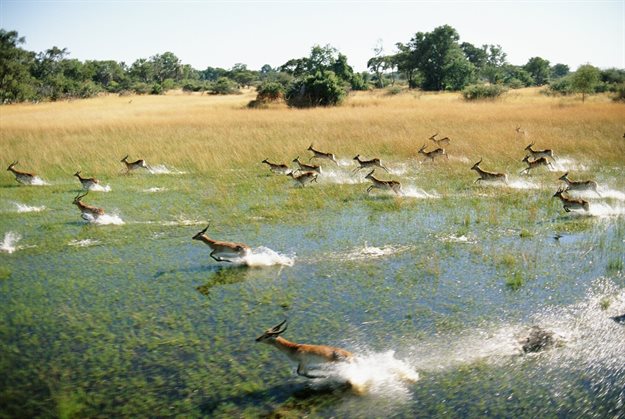






The Aichi biodiversity target number 15, and coincidentally SDG 2030: Goal 6, 14 and 15 emphasise the importance of halting biodiversity loss, enhancing ecosystem resilience through efforts such as restoration or rehabilitation. Some of these aspired targets are due now, in 2020! In fact, recently, the UN declared 2021-2030 a decade of ecosystem restoration. The International Society for Ecological Restoration in its conference held in South Africa in September 2019 also issued a statement committing to a global call on financing the restoration of landscapes. The Africa Agenda 2063 and NDP 2030, similarly call for all nations to take care of nature in their efforts to meet their developmental imperatives.
In turn, the healthy nature (or ecological infrastructure) will continue to provide the free basic services to humans and economies. Noting the poor relationship between man and nature, the World Economic Forum continues to alert the nations of the world that biodiversity, water, inadequate action on climate mitigation and adaptation still top the list of highest risks to our survival.
Perhaps the once perceived as conspiracy projections on the impacts of climate change in the last couple of decades is much more real today and felt by all, particularly marginalised communities. Many in SA are very familiar with the so called “Day Zero” and what it means to livelihoods. Most parts of the Eastern Cape province are currently battling with “Day Zero” with no end in sight!
It’s not surprising that the Ramsar Convention has re-dedicated the 2020 World Wetlands Day to call on all nations to sustain or improve their efforts towards sustainable utilisation and protection of wetlands/biodiversity. In SA, the Water Research Commission has led the mapping of wetlands and is still going ahead with even finer efforts to locate and ensure their restoration. Of roughly 5,202,676ha of wetlands mapped, 23 are Ramsar sites (800,000ha). The National Freshwater Ecosystem Priority Areas (NFEPA) published in 2011, based on biodiversity sensitivity and rivers of high significance, is now due for a review and update in an attempt to further protect our lives, our biodiversity and heritage. Recently, the WRC and partners listed 23 strategic water resource areas. These catchment areas make up 10% of SA land, but generate 50% of water resources the country needs for growth and job creation. However, these wetlands and strategic water resource areas are mainly unprotected (outside protected areas) and that leaves them highly vulnerable.
As a way of illustration, the National Biodiversity Assessment (2018) produced yet another very depressing reality that all water resources are highly threatened. These are wetlands, estuaries, rivers and marine resources with the first two in the worst situation, 70%-80% threatened. This is bad news to species that reside /or visit these ecosystems. Unhealthy ecosystems (or degraded ecological infrastructure) such as these cannot be expected to continue providing services that benefit society and business. There can never be a prosperous economy where water and biodiversity are under such pressure.

Dams are silting up due to soil erosion from poorly managed landscapes. Rivers and wetlands are toxic from irresponsible mining and agriculture, and wastes, including plastics. In fact, the 2030 vision of realising poverty eradication seems quite far from the nearest horizon. Rice that is consumed almost globally grows in wetlands. Fish, amphibians, birds, and numerous plants and invertebrate species breed in wetlands, providing the attraction that South African tourism is well-known for - the beauty. There are already reports led by the WRC which provide evidence that tourism in SA is in decline, a shocking reality as traditional projections (which ignore threats to natural resources) are contradictory. This has obvious ramifications on a country battling with an estimated 29% unemployment rate and struggling economy on a global scale.
Degradation of wetlands habitat biodiversity and species means our future generation will inherit systems with no resilience in the light of global change, particularly to climate. Wetlands that are sick cannot store carbon (carbon sequestration), purify water, alleviate disastrous flood impacts. Many wetland plant species are a great source of medicine, particularly to marginalised rural communities, indeed recent studies show that there is an expanding cosmeceutical market from these plants, which can only be jeopardised by climate change and pollution, resulting in biodiversity loss.
These threats are worsened by the exponential spread of alien and invasive plants, despite billions being spent in their attempted control. Indeed, these exotic plants are the worst thirsty thieves of our limited water resources. WRC and partner reports provided details on the role of wetlands in managing the flow of water-sustaining livelihoods downstream way into the drought times. Some studies have just been completed from the uMngeni catchment. More than R201m must be invested in restoration of the highly degraded wetlands and river ecosystems in this economically important catchment. The return on this investment has been estimated and outweighs the costs (the expenditure on chemicals required to treat polluted water to potable) by billions!
It remains with district and local municipalities, and indeed national departments, such as water and sanitation, and environment, forestry and fisheries to mainstream ecological infrastructure with grey infrastructure, thereby saving immensely on water resources management. Wetlands are not wastelands to be filled and converted to roads and housing land, but have value and must be protected for the benefit of current and future citizens and economy.
Turning a blind eye on the massive destruction of these valuable ecosystems is the same as committing economic suicide! Caring for wetlands by acting now in order to realise the aspired SDG, UN, Africa Agenda, and NDP goals is everybody’s business, particularly the citizen scientists. Every ward and municipality has inhabitants and all must partner in changing the bleeding landscape to an inhabitable space.
The global economy is totally dependent on a continual supply of water to support industrial growth, produce enough food and sustain jobs. Yet wetlands are one of the most threatened habitats in SA and globally. A call is made to citizens, the private sector and departments (especially DEFF/DWS/agriculture/mining/municipalities) to act now before biodiversity loss reaches its threshold or tipping point through investing in the restoration of degraded ecosystems. This is a very urgent matter and all the necessary guidelines/methods for restoration are available, tested and ready for implementation. Save biodiversity. Save economy. Save lives!